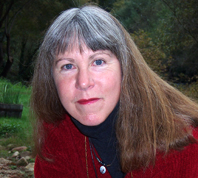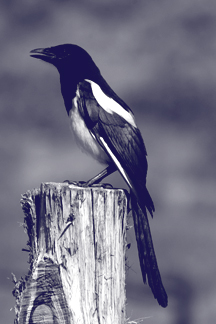|
|
|
On Integrity and Presence: The Holiness of Magpies
by Susan Chernak McElroy • Teton Valley, Idaho
Every creature is a word of God and a book about God. ~ Meister Eckhart
The nest sat like a frizzy brown tetherball in a tree too narrow for me to climb, on limbs too thin for me to negotiate. On the ground sat a big-mouthed baby bird the size of my hand who looked like a glob of pink Silly Putty covered in toothpicks. The youngster’s unopened quill feather s were shaded black and white. His eyes were curious and unafraid. When I knelt down by him, he eagerly opened a red mouth the size of a small halved plum and fluttered hopefully. s were shaded black and white. His eyes were curious and unafraid. When I knelt down by him, he eagerly opened a red mouth the size of a small halved plum and fluttered hopefully.
Overhead, a pair of magpies shrieked and dove. One of them was courageous enough to poke me on top of my head with a hard beak. I knew they would feed their nestling on the ground, and I knew also that the youngster didn’t have a chance of survival down there. Come nightfall, he would make a fine appetizer for a passing coyote, skunk, or raccoon, or perhaps he would simply freeze to death by morning.
In my mind, I clicked off all the reasons to leave him there and all the reasons to take him home. First, the reasons to leave him: Many birds fall out of their nests; it’s nature’s way. He’ll probably die no matter what you do; humans shouldn’t interfere. Maybe the parents shoved him out because he’s sick. You don’t have time for this.
Then, the reasons to take him: The poor little guy trusts me; he’s hungry. He’s not “a” magpie; he’s “this” magpie; and I’m not “a” human, I’m “this” human, who will feel wretched if I leave him here.
I’ll make time for this.
In the course of the world, this interaction between one human and one bird would seem to mean nothing, but I’ve never been much of a believer in “what seems.” We inhabit a grand, big planet, and we affect the doings of the planet by our movements in the small, private worlds of our own experience. This smaller world is an intensely personal one bounded at its edges by encounters with things, places, events, and beings that come to represent the larger world to us. If — as the sages and physicists tell us — on some mysterious and confounding level we are all one, then perhaps the good intentions of one human regarding one magpie amount to something.
Under a shower of magpie curses from above, I picked up the nestling and tucked him under my shirt. At home, I placed him in an old woven picnic basket lined with tissues.
Since magpies are scavengers and omnivores like us, I had no trouble putting together food for him. As a base, I soaked some dry dog food until it was soggy, added a chopped hard-boiled egg, part of a banana, and we were in business. Then, I cut a plastic straw in half the long way, rounded the end so it looked like a miniature trowel, and scooped up some of the bird glop. The magpie made mewing sounds as I dropped the food into his throat and gargling noises while swallowing it. Three times I scooped up a ball of glop for him before he pulled his head back down, shuffled his wings, pooped, and closed his eyes. This would be our hourly routine for several weeks. I christened the magpie Amos, and took him just about everywhere with me. Spring wove its way into early summer, and Amos matured.
Along with glossy feathers and a shimmering tail, Amos was growing a distinct personality. Living with magpies is one thing. Living day to day with one magpie is something much different. By mid summer, Amos had his wings and his freedom. Living away from the busyness and dangers of town, I chose to let Amos come and go as he wanted. He would return to me with a whistle, still liked to eat from a dish at the kitchen counter, and had made peace with the dogs and cat in some silent manner I would never understand. During the long twilight of summer evenings, he would sit outside with me, prancing up and down my arms and snatching up mosquitoes as they landed to feed.
Amos had the stereotypical raucous, flamboyant, strutting magpie persona. But in getting to know him as I did, I discovered a deeper stratum flowing beneath his everyday magpie-ness. There was a quiet and deep intelligence in his black eyes, and a calm, dignified aura about him that became evident the moment he folded his wings and became still.
Sometimes when I took long walks, he would accompany me, riding on my shoulder or flying tree to tree alongside me. He was a good listener and would give you his full attention when you needed to talk, sometimes muttering human-sounding exclamations of encouragement or surprise. And he was affectionate, too, happy to snuggle into your hands and bow his head for a good rub or to preen the hairs on your arms.
In his active moments, he worked hard and kept fully focused on whatever he was doing, whether it was balancing on the back of a cow or taking apart an old splinter of barn wood. Everything seemed important enough to him to require his all, and I thought that if humans could bring such fullness and presence to all tasks, there would be no work that was undignified or menial, and no play that was not noble and important.
As the summer ripened, Amos spent less and less time at the cabin. Eventually, there came the day when he didn’t return home to roost under the porch in the evening. He’d been flying with other
magpies, and I liked to think they talked him into running away from home. And so I suppose he did. I missed him for a long, long time. I still miss him in the way that one misses the presence of something holy that has come and gone. If holy defines a character that evokes special respect or reverence, there was an un-adorned holiness to Amos. He was a devoted keeper of the Original Instructions, or Law of Life. In his way, he tutored me in the qualities needed to live a deeply spiritual, deeply integrated life: focus, stillness, play, friendship, love, beauty, routine, joy.
There is sanctity in every wild thing, a presence that reaches out to anoint us with a goodness and wisdom of its own. We live in a world of untamed avatars, some in the guise of creatures we are most likely to dismiss. No matter their form or color, each creature is a magnificent tutorial on living with presence and integrity. Now when a cloud of black-and-white birds descends onto my bird feeders with croaking voices and great commotion, I remember Amos and I am grateful for the holiness of magpies.
Excerpted from Why Buffalo Dance © 2006 by Susan Chernak McElroy with permission of New World Library. www.newworldlibrary.com or 800 972-6657 ext. 52.
Susan Chernak McElroy is a storyteller & teacher, who has written numerous books, including the bestselling classic, Animals as Teachers and Healers. www.susanchernakmcelroy.com.
|

